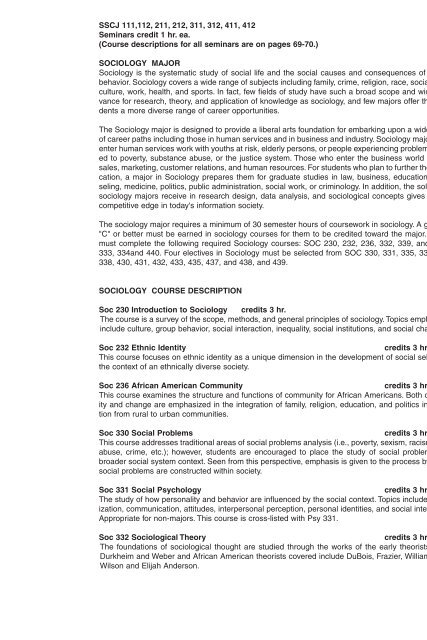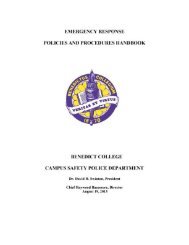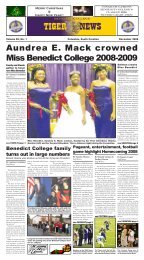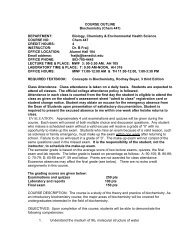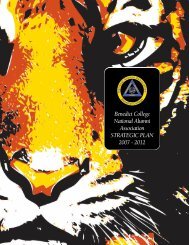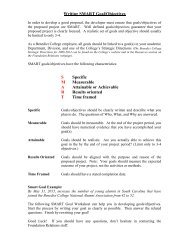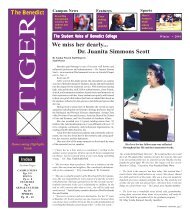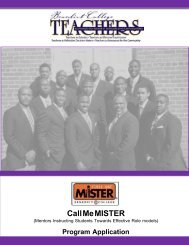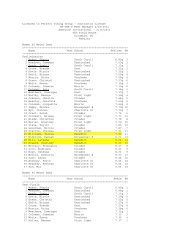2009-2011 - Benedict College
2009-2011 - Benedict College
2009-2011 - Benedict College
You also want an ePaper? Increase the reach of your titles
YUMPU automatically turns print PDFs into web optimized ePapers that Google loves.
SOCIAL SCIENCES AND CRIMINAL JUSTICE DEPARTMENT 201<br />
SSCJ 111,112, 211, 212, 311, 312, 411, 412<br />
Seminars credit 1 hr. ea.<br />
(Course descriptions for all seminars are on pages 69-70.)<br />
SOCIOLOGY MAJOR<br />
Sociology is the systematic study of social life and the social causes and consequences of human<br />
behavior. Sociology covers a wide range of subjects including family, crime, religion, race, social class,<br />
culture, work, health, and sports. In fact, few fields of study have such a broad scope and wide relevance<br />
for research, theory, and application of knowledge as sociology, and few majors offer their students<br />
a more diverse range of career opportunities.<br />
The Sociology major is designed to provide a liberal arts foundation for embarking upon a wide range<br />
of career paths including those in human services and in business and industry. Sociology majors who<br />
enter human services work with youths at risk, elderly persons, or people experiencing problems related<br />
to poverty, substance abuse, or the justice system. Those who enter the business world work in<br />
sales, marketing, customer relations, and human resources. For students who plan to further their education,<br />
a major in Sociology prepares them for graduate studies in law, business, education, counseling,<br />
medicine, politics, public administration, social work, or criminology. In addition, the solid base<br />
sociology majors receive in research design, data analysis, and sociological concepts gives them a<br />
competitive edge in today's information society.<br />
The sociology major requires a minimum of 30 semester hours of coursework in sociology. A grade of<br />
"C" or better must be earned in sociology courses for them to be credited toward the major. Majors<br />
must complete the following required Sociology courses: SOC 230, 232, 236, 332, 339, and SSCJ<br />
333, 334and 440. Four electives in Sociology must be selected from SOC 330, 331, 335, 336, 337,<br />
338, 430, 431, 432, 433, 435, 437, and 438, and 439.<br />
SOCIOLOGY COURSE DESCRIPTION<br />
Soc 230 Introduction to Sociology credits 3 hr.<br />
The course is a survey of the scope, methods, and general principles of sociology. Topics emphasized<br />
include culture, group behavior, social interaction, inequality, social institutions, and social change.<br />
Soc 232 Ethnic Identity<br />
credits 3 hrs.<br />
This course focuses on ethnic identity as a unique dimension in the development of social self within<br />
the context of an ethnically diverse society.<br />
Soc 236 African American Community<br />
credits 3 hrs.<br />
This course examines the structure and functions of community for African Americans. Both continuity<br />
and change are emphasized in the integration of family, religion, education, and politics in transition<br />
from rural to urban communities.<br />
Soc 330 Social Problems<br />
credits 3 hrs.<br />
This course addresses traditional areas of social problems analysis (i.e., poverty, sexism, racism, child<br />
abuse, crime, etc.); however, students are encouraged to place the study of social problems in a<br />
broader social system context. Seen from this perspective, emphasis is given to the process by which<br />
social problems are constructed within society.<br />
Soc 331 Social Psychology<br />
credits 3 hrs.<br />
The study of how personality and behavior are influenced by the social context. Topics include socialization,<br />
communication, attitudes, interpersonal perception, personal identities, and social interaction.<br />
Appropriate for non-majors. This course is cross-listed with Psy 331.<br />
Soc 332 Sociological Theory<br />
credits 3 hrs.<br />
The foundations of sociological thought are studied through the works of the early theorists Marx,<br />
Durkheim and Weber and African American theorists covered include DuBois, Frazier, William Julius<br />
Wilson and Elijah Anderson.


